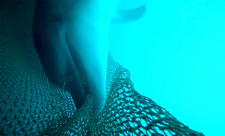ENVIRONMENTInteractions between fisheries and the marine environment and ecosystems
Marine spatial planning |
Dolphin Depredation
Interactions between fisheries and cetaceans can harm the species (bycatch), but equally they can harm the fishers: species may remove fish from gear, damage gear, or interfere with baits in a process known as depredation. Dolphins which feed on highly commercial species (e.g. small pelagics) can cause particularly severe damage to fishing gear and high levels of product loss, directly impacting fishers, who must spend time and money repairing torn nets while receiving lower incomes because of reduced catches.
In the Mediterranean, recurring depredation events mainly occur in Morocco (by bottlenose dolphins in purse seine fisheries), Tunisia (by dolphins in purse seine fisheries and aquaculture farms) and Türkiye (by dolphins in gillnet and demersal trawl fisheries), as well as in Italy and Spain. Such depredations can be attributed to spatial overlap, resource competition and/or behavioural learning. Solutions are needed to reduce the conflicts depredation generates and to support the livelihoods of fishers it affects, while also ensuring the conservation of the vulnerable species concerned.
DEPREDATION PROJECT
GFCM ACTIONS
- Compilation of information on the interaction between bottlenose dolphins and fisheries and aquaculture according to standard data collection methodologies
- Compilation of complementary baseline information on depredation through a regional review
- Conduction of a comprehensive study of the ecological and population dynamics of bottlenose dolphins in relation to fisheries and aquaculture activities
- Testing of mitigation technologies, including exchange of experiences and best practices
- Assessment of the long-term sustainability of the small pelagic fisheries in the context of stock reduction and competition for the resource


